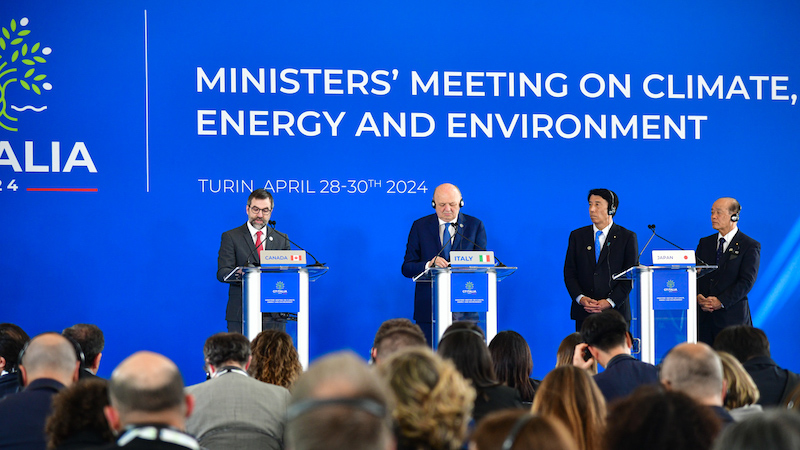When UN climate chief Simon Stiell addressed climate and energy ministers from the G7 group of rich nations on Monday, he issued a frank message: “It is utter nonsense to claim the G7 cannot – or should not – lead the way on bolder climate actions.”
He added those countries should be “leading from the front” through much deeper emissions cuts, and bigger and better climate finance.
A day later, the gathering of the most powerful industrialised democracies responded with a tepid outcome, serving up a new commitment on ending coal power generation – weakened by a loophole in the language – a rehash of previous pledges and nothing new on climate finance, this year’s top priority in climate diplomacy.
For the first time, G7 countries all agreed to end the use of coal power generation in their energy systems “during the first half of the 2030s”.
While most members of the bloc are already planning to phase out coal before 2035, the commitment marks a step forward for Japan, analysts said. The Asian nation generates over a quarter of its energy from coal and, alongside Germany and the United States, had previously blocked international efforts towards setting a target date to shut down coal power plants.
Germany has written into its legislation a final target to exit coal by 2038 at the latest, but the government now intends to pull that forward to 2030. The United States unveiled new regulations last week under which coal plants planning to stay open beyond 2039 will have to cut or capture 90 percent of their carbon dioxide (CO2) emissions by 2032.
Not enough
But the G7 coal-power agreement struck on Tuesday in Turin, Italy, comes with a caveat that gives countries an alternative choice to phase out coal “in a timeline consistent with keeping a limit of 1.5°C temperature rise within reach, in line with countries’ net-zero pathways”.
Gilberto Pichetto Fratin, Italy’s minister for environment and energy security, told journalists at the end of the summit that the text “for the very first time uses a deadline, wherever possible”.
“G7 countries undertake to phase out the use of coal without jeopardising the various countries’ economic and social equilibrium,” he added.
Researchers say that, even if countries do stick to the mid-2030s deadline, it will not be enough to limit global warming in line with the goals of the 2015 Paris Agreement.
G7 countries need to phase out coal from power generation by 2030 at the latest, and gas by 2035, according to a recent analysis done by Berlin-based policy institute Climate Analytics.
“It’s notable that gas has not been mentioned [in the G7 ministerial agreement],” said Jane Ellis, head of climate policy at Climate Analytics, pointing at increased investment in domestic gas facilities. “This is absolutely the wrong direction to be heading in – both economically and for the climate.”
In their final communique, ministers said that “publicly supported investments in the gas sector can be appropriate as a temporary response, subject to clearly defined national circumstances”, in their efforts to reduce dependency on imported Russian fossil fuels.
They also repeated a previous commitment to eliminate “inefficient fossil fuel subsidies by 2025 or sooner”, without providing a clearer definition of “inefficient” or details on how that goal would be achieved.
Fossil fuel subsidies across G7 countries hit an all-time high of $199.1 billion in 2022, according to analysis by IISD and the OECD. “It’s very clear they are not going to meet that target,” said Farooq Ullah, senior policy advisor at IISD.
No progress on climate finance
This week’s ministerial meeting in Italy also failed to significantly move the needle on climate finance, as UN negotiations on a new collective quantified goal (NCQG) at COP29 in November are starting to gather pace.
G7 countries said in their final text they “intend to be leading contributors to a fit-for-purpose goal” and acknowledged the need for “mobilising trillions”, but stopped short of making any new financial commitment or offering clear ways forward.
The existing goal is set at $100 billion a year, but developing countries – excluding China – need an estimated $2.4 trillion a year to meet their climate and development needs, leading economists have said in a report commissioned by the Cop26 and Cop27 presidencies.
In order to loosen the purse strings, it is crucial that every minister across government cabinets – and especially finance ministers and treasurers – “push climate action into high gear”, the UNFCCC’s Stiell said on Monday.
But, according to Luca Bergamaschi, director of Italian think-tank ECCO, they appear “not to be caring enough about climate finance”.
“Climate ministers are hitting a wall on climate finance. These decisions rest on finance ministers so they need to step up, and step in, because they have the power and responsibility to do so,” he told Climate Home.
Meetings of G7 finance ministers in mid-May and country leaders in June are seen as last-ditch opportunities to push things forward.
Experts believe an ambitious deal on climate finance at COP29 can play a crucial role in getting developing countries, especially the poorest ones, to commit to stronger action on curbing emissions and boosting adaptation as they draft their new national climate plans due early next year.
The G7 ministers in Italy made a firm pledge to submit their own such plans – called nationally determined contributions (NDCs) – by the February 2025 deadline “with economy-wide, absolute reduction targets” that cover all greenhouses gases and sectors “in line with 1.5C”. They also called on other major economies to do the same.
(Reporting by Matteo Civillini; editing by Sebastián Rodríguez and Megan Rowling)

